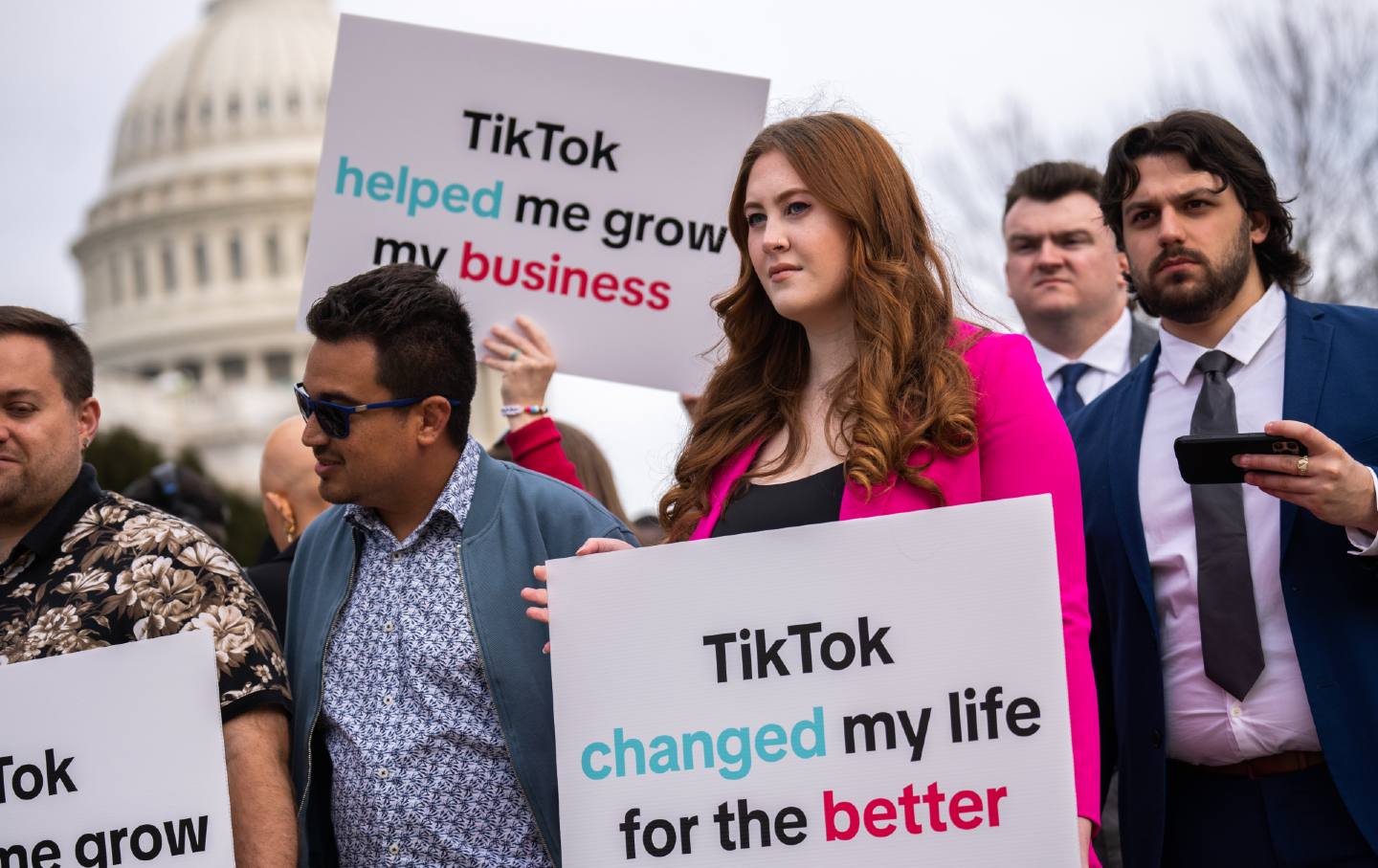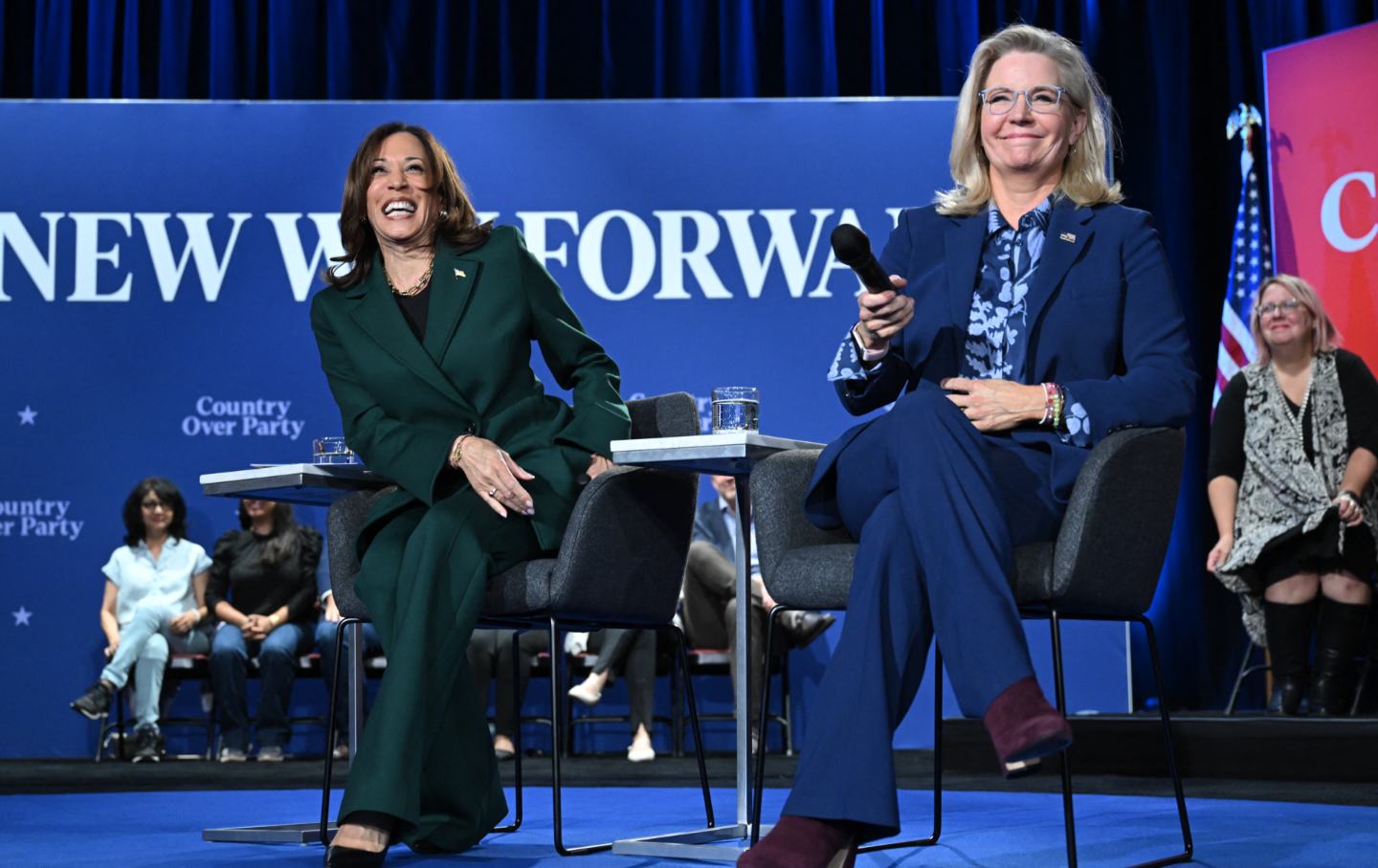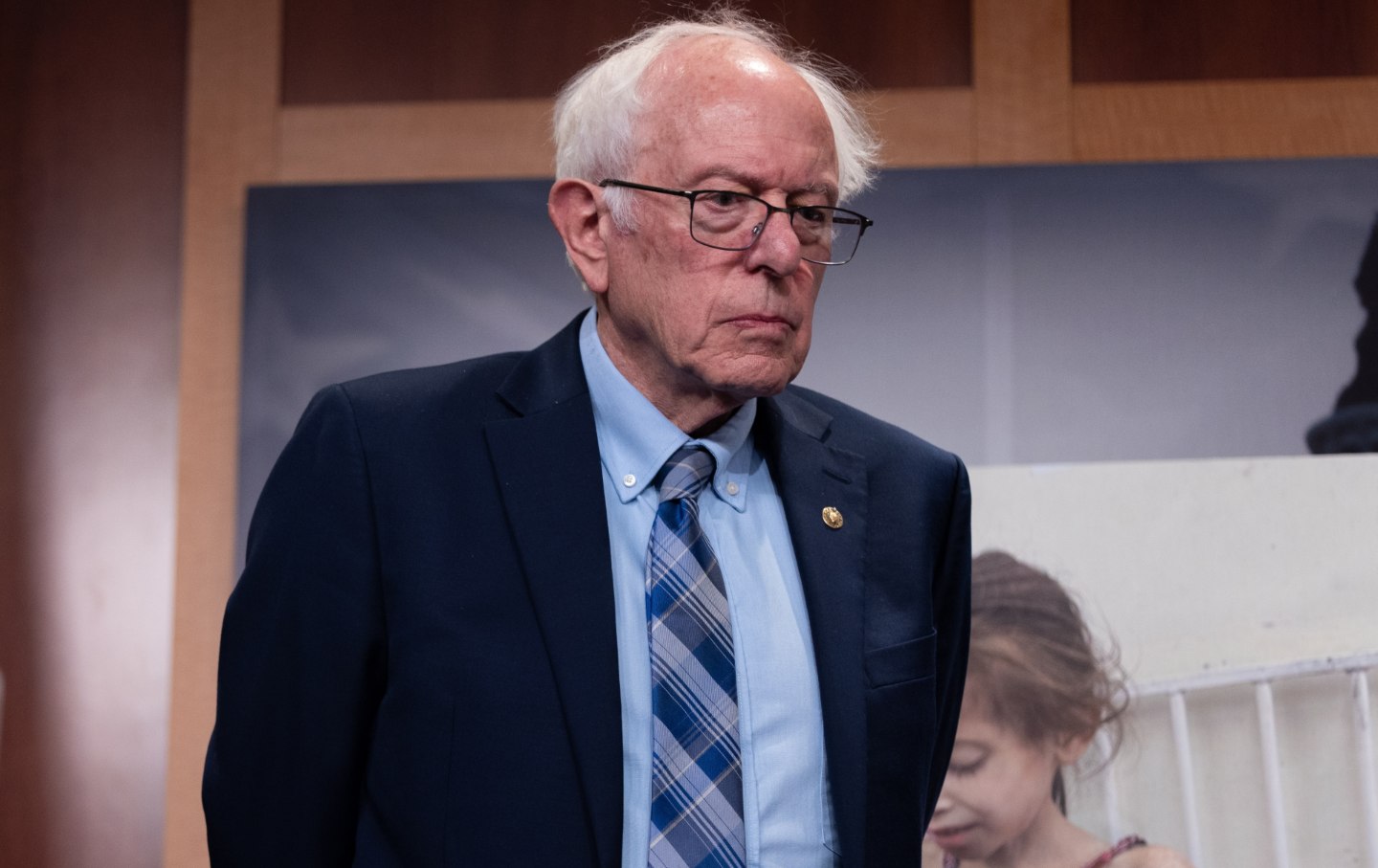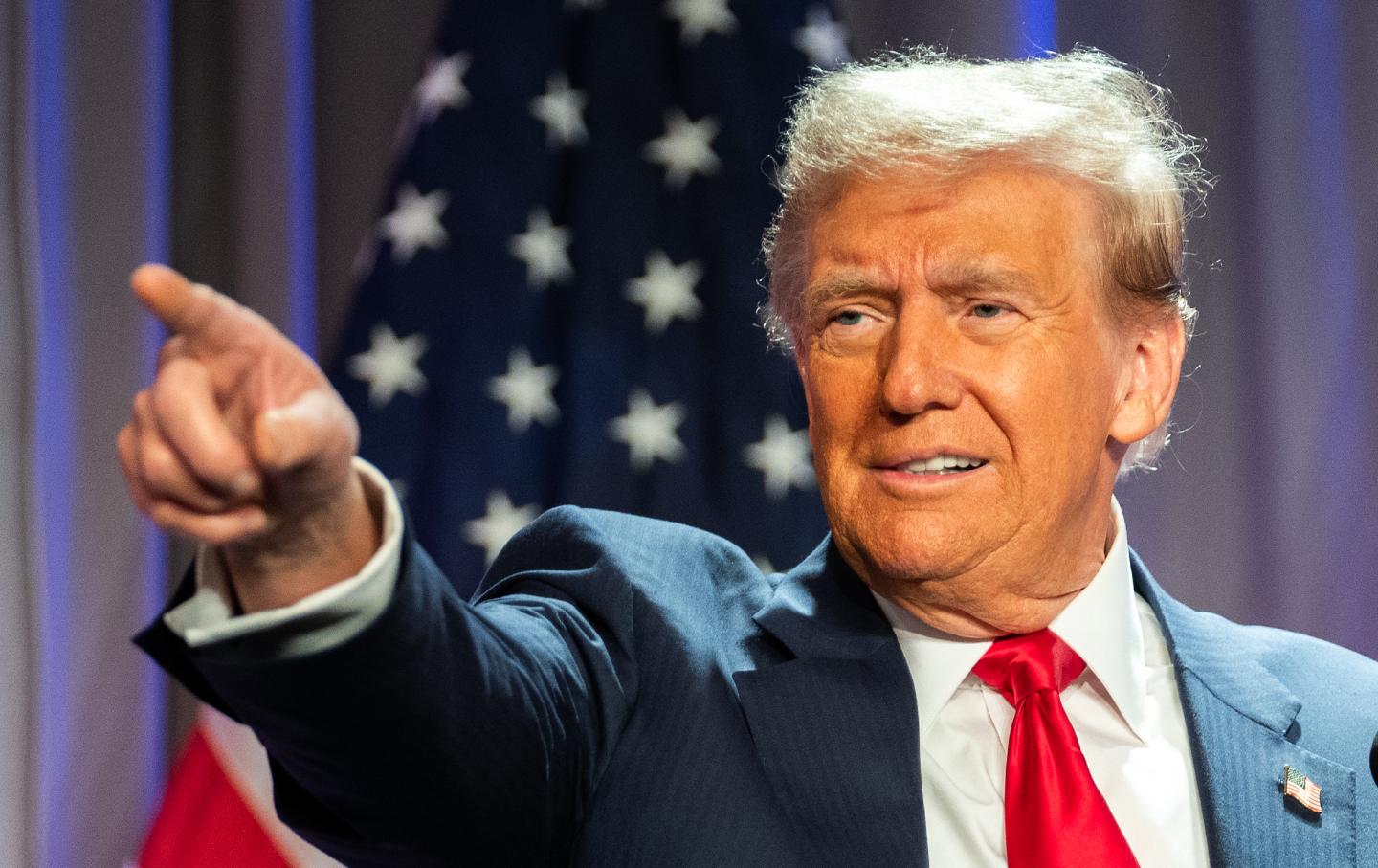Loath as I Am to Agree With Marjorie Taylor Greene…
How the effort to bank TikTok is a fascinating case study in transpartisan politics.

Earlier this month, millions of young Americans opened TikTok on their phones and were faced with a startling message: “Stop a TikTok shutdown,” it read. “Speak up now—before your government strips 170 million Americans of their Constitutional right to free expression.” A bright red “call now” button appeared at the bottom of the screen.
This rare call for direct action came in response to the Protecting Americans from Foreign Adversary Controlled Applications Act—a bill that would prevent any online application that is controlled by a “foreign adversary” from being hosted in the United States, unless said app is divested from said adversary. (In this case, America’s foreign adversaries are defined as China, Russia, Iran, and North Korea.) And just in case that was too subtle, it explicitly names TikTok as needing to be divested from its Chinese parent company, ByteDance.
While the bill overwhelmingly passed in the House 352-65, the members in opposition don’t fall neatly along party lines. The list includes progressive Democrats and Freedom Caucus Republicans who have come to the same conclusion, albeit from different presuppositions.
The effort to ban TikTok—and the backlash that has followed—has been a fascinating case study in transpartisan politics. Prominent figures on both sides of the aisle have cited a wide range of concerns, including data privacy, national security, freedom of speech—and, perhaps most saliently this election year, the transformative effect the bill could have on presidential power.
Advocates for the bill have insisted that it is not technically a ban—that TikTok could continue to be used in the United States so long as ByteDance sells it within six months of the law’s enactment. But that appears to be a nonstarter, as both ByteDance and China are highly unlikely to cooperate with such a requirement. All signs indicate that a signature from President Biden would result in the app’s disappearance in the United States.
What could be even more impactful than the non-ban ban, though, is the way it is enforced. The bill applies to any website or application with over a million monthly visitors that allows users to create accounts and share content. If it has so much as a comments section, it counts. No one is even sure how many apps the bill could ban as soon as it gets signed.
That would be up to the White House. The bill gives the president the authority to determine whether an app controlled by a foreign adversary poses a “significant threat to the national security of the United States.” It also requires him to approve its sale, which means that even if a given tech company tried to cooperate, he could stonewall indefinitely to effectively ban the app anyway.
Then there’s the vagueness of what constitutes “control” by a foreign adversary. The bill leaves that up to interpretation too. The company doesn’t even have to be based in a foreign adversary country to have its apps banned—it just has to be “subject to the direction or control” of someone who is.
As one technology lawyer put it: “The President really has the unchecked power to put another app on this list.”
The bill’s opponents include Democratic representatives like Ro Khanna, who represents Silicon Valley and would rather protect data privacy with a more “narrowly tailored law.” Jamaal Bowman thinks the bill is driven by “xenophobic anti-China rhetoric,” while Alexandria Ocasio-Cortez wants information about the alleged security risks to be made public. “This is putting the cart before the horse,” she said, on TikTok.
Meanwhile, on the other side of the aisle, Nancy Mace thinks it is “not the role of government to ban apps from the app store.” Matt Gaetz says the bill is “rushed” and “overbroad.” Marjorie Taylor Greene worries it would “open Pandora’s box” and lead to more censorship down the line.
Loath as I am to agree with Marjorie Taylor Greene, giving the president near-unilateral authority to ban free-speech platforms could very well backfire—especially if that president is Donald Trump. Imagine handing that kind of power to the man who recently called Facebook an “enemy of the people,” who is known for harboring personal vendettas, and who owns a competing social media platform of his own. What could go wrong?
Popular
“swipe left below to view more authors”Swipe →The concerns about TikTok are genuine, but so are the concerns of those opposing the bill. It would be more responsible—and more effective—to regulate how the company collects and uses Americans’ personal data. Last week, the Department of Justice sued to regulate Apple; the same could be done with TikTok.
Regulation would help curb misinformation, which spreads like wildfire on the app. It would also—as opposed to an outright ban—prevent backlash among young voters ahead of a close election. And it won’t set a precedent of unchecked executive power, so Trump can’t ban Twitch because he thinks its owner’s business interests in China count as foreign control.
One hundred and seventy million Americans use TikTok. That’s more than half the population, including one-third of adults and almost two-thirds of people under 30. Regulatory action would make the app safer to use, without banning one of the country’s most popular social media platforms—and angering most of the country in the process.
We cannot back down
We now confront a second Trump presidency.
There’s not a moment to lose. We must harness our fears, our grief, and yes, our anger, to resist the dangerous policies Donald Trump will unleash on our country. We rededicate ourselves to our role as journalists and writers of principle and conscience.
Today, we also steel ourselves for the fight ahead. It will demand a fearless spirit, an informed mind, wise analysis, and humane resistance. We face the enactment of Project 2025, a far-right supreme court, political authoritarianism, increasing inequality and record homelessness, a looming climate crisis, and conflicts abroad. The Nation will expose and propose, nurture investigative reporting, and stand together as a community to keep hope and possibility alive. The Nation’s work will continue—as it has in good and not-so-good times—to develop alternative ideas and visions, to deepen our mission of truth-telling and deep reporting, and to further solidarity in a nation divided.
Armed with a remarkable 160 years of bold, independent journalism, our mandate today remains the same as when abolitionists first founded The Nation—to uphold the principles of democracy and freedom, serve as a beacon through the darkest days of resistance, and to envision and struggle for a brighter future.
The day is dark, the forces arrayed are tenacious, but as the late Nation editorial board member Toni Morrison wrote “No! This is precisely the time when artists go to work. There is no time for despair, no place for self-pity, no need for silence, no room for fear. We speak, we write, we do language. That is how civilizations heal.”
I urge you to stand with The Nation and donate today.
Onwards,
Katrina vanden Heuvel
Editorial Director and Publisher, The Nation
More from The Nation

How Loyalty Trumps Qualification in Trump Universe How Loyalty Trumps Qualification in Trump Universe
Meet “first buddy” Elon Musk.

Bury the #Resistance, Once and For All Bury the #Resistance, Once and For All
It had a bad run, and now it’s over. Let’s move on and find a new way to fight the right.

Trans People Shouldn’t Be Scapegoated for Democrats’ Failures Trans People Shouldn’t Be Scapegoated for Democrats’ Failures
Politicians and pundits are stoking a backlash to trans rights in the wake of the election. They’re playing a dangerous game.

Bernie Sanders Is Leading a Bold New Effort to Block Arms Sales to Israel Bernie Sanders Is Leading a Bold New Effort to Block Arms Sales to Israel
The senator has more allies than ever in his fight to hold Israel accountable and save lives in Gaza.

Will “Serious” Republicans Block Any of Trump’s Freak-Show Cabinet Picks? Will “Serious” Republicans Block Any of Trump’s Freak-Show Cabinet Picks?
Will they stand up to even the scariest of these nominees? I’m not optimistic.

Harris’s Gaza Policy Was a Disaster on Every Level Harris’s Gaza Policy Was a Disaster on Every Level
Palestine may not have swung the election one way or another. But Democrats unquestionably paid a high price for their refusal to hold Israel accountable.


